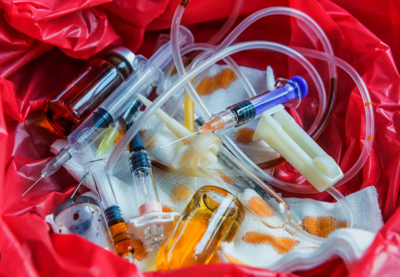
Pathological and chemotherapy waste isn’t just another type of medical waste — it’s among the most sensitive and tightly regulated. Clinics and surgical centers in Florida, especially oncology and lab facilities, must follow specific handling and disposal procedures to protect staff, patients, and the environment. Partnering with trusted Medical Waste Solutions providing professionals ensures that every vial, tissue sample, or chemo-contaminated glove is treated safely and legally, minimizing risk and maintaining compliance.
Understanding Pathological Waste
Pathological waste includes any human or animal tissue, organ, or body part removed during surgery, biopsy, or autopsy. Because this waste may contain infectious materials, it must be handled separately from general medical waste.
Typical examples include:
Surgical specimens and tissues
Body parts removed during medical procedures
Animal carcasses from research labs
Contaminated materials used in pathological examinations
This waste type is not just about safety — it’s about dignity and respect in handling biological material properly.
Chemotherapy Waste: Small Volume, High Risk
Chemotherapy waste may represent a small percentage of a clinic’s overall output, but it carries significant risks. Items such as IV tubing, empty vials, gloves, gowns, and absorbent pads contaminated with chemo drugs require specialized disposal.
Improper handling can expose staff to cytotoxic chemicals — substances that can harm living cells. For this reason, all chemo waste must be segregated into yellow containers labeled for incineration only, ensuring that nothing reenters the environment untreated.
Regulations That Clinics Must Follow
Federal and state agencies have strict regulations governing both pathological and chemo waste:
EPA (Environmental Protection Agency): Oversees hazardous waste storage and disposal.
OSHA (Occupational Safety and Health Administration): Requires proper labeling and employee protection from exposure.
Florida Department of Health: Enforces biomedical waste handling under Chapter 64E-16 of the Florida Administrative Code.
Failure to comply can result in fines, shutdowns, or — worse — exposure incidents that put patient safety and public health at risk. Working with a compliant Miami medical waste disposal partner simplifies this process by ensuring your facility stays aligned with all these requirements.
How to Handle Pathological Waste Safely
Proper handling starts at the source. Here’s a simple checklist for clinics:
Segregate immediately: Place tissues or body parts in separate containers labeled “Pathological Waste.”
Use proper containers: Leak-proof, rigid bins that are clearly marked for incineration.
Limit storage time: Never let waste accumulate beyond state-mandated holding periods.
Keep documentation: Maintain manifests for every pickup or transfer.
Handling it right from the start saves your team from compliance headaches later.
Managing Chemotherapy Waste
Handling chemo-related materials requires a cautious approach:
Use yellow, puncture-resistant containers for trace chemo waste.
Ensure staff wear protective gloves and masks when handling contaminated materials.
Store waste in a designated area away from regular trash and red bag waste.
Schedule frequent pickups to prevent accumulation of hazardous materials.
And yes, labeling matters — inspectors love labels as much as nurses love coffee on a 12-hour shift.
The Importance of Staff Training
Even the best containers won’t help if employees aren’t properly trained. Every staff member who handles biomedical waste should know:
What qualifies as pathological or chemo waste
Where it belongs
How to seal, label, and store it safely
Who to call for disposal
Annual refreshers and short in-service updates can prevent costly mistakes. A well-trained staff means fewer incidents, smoother inspections, and safer workplaces.
Environmental and Ethical Responsibility
Improper disposal of pathological or chemotherapy waste doesn’t just risk fines — it can lead to environmental contamination. When incinerated properly, these materials are rendered harmless and unrecognizable.
Florida’s waste-to-energy initiatives make this process even more sustainable, turning treated waste into fuel instead of sending it to landfills. That’s a win for public health and the planet.
What This Means for You
For clinics and oncology centers, proper disposal of pathological and chemotherapy waste is both a compliance requirement and a moral responsibility. Following best practices protects your staff, patients, and community from unnecessary exposure.
If your facility needs dependable Miami medical waste disposal services, MedWaste Solutions provides licensed collection, treatment, and waste-to-energy conversion directly through its Florida-based plant — no brokers, no markups, and complete regulatory compliance from pickup to final processing.


(0) comments
We welcome your comments
Log In
Post a comment as Guest
Keep it Clean. Please avoid obscene, vulgar, lewd, racist or sexually-oriented language.
PLEASE TURN OFF YOUR CAPS LOCK.
Don't Threaten. Threats of harming another person will not be tolerated.
Be Truthful. Don't knowingly lie about anyone or anything.
Be Nice. No racism, sexism or any sort of -ism that is degrading to another person.
Be Proactive. Use the 'Report' link on each comment to let us know of abusive posts.
Share with Us. We'd love to hear eyewitness accounts, the history behind an article.